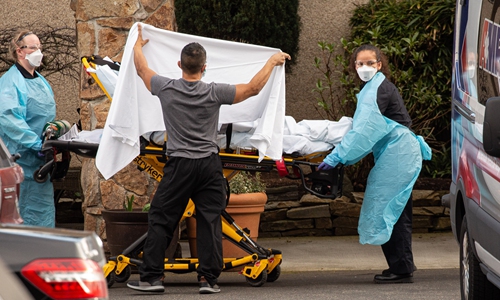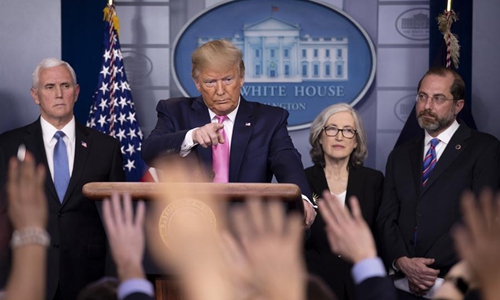HOME >> CHINA,SPECIAL-COVERAGE
US scrambles to tackle virus
By GT staff reporters Source:Global Times Published: 2020/3/1 22:53:40
Political factors, testing delay hinder White House’s readiness

Healthcare workers transport a patient on a stretcher into an ambulance at Life Care Center of Kirkland on Saturday in Kirkland, Washington. Dozens of staff and residents at Life Care Center of Kirkland are reportedly exhibiting coronavirus-like symptoms with two confirmed cases of COVID-19 so far. Photo: AFP
As now daily infections outside China have exceeded the number in China and with first confirmed death reported in the US, more questions have been raised about the preparedness of other governments in face of the outbreak. In the US, finger-pointing, partisan politics and presidential election might all jeopardize the virus-control work and undermine the fundamental interests of the American public.
Officials in Washington state announced on Saturday the first death from the novel coronavirus pneumonia, officially known as COVID-19, which was the first such death in the US.
However, US President Donald Trump mistakenly described the patient, who was a man in his 50s, as a "wonderful woman" during a press conference while the US Centers for Disease Control and Prevention (CDC) later took the blame by claiming it mistakenly identified the patient as female in a briefing to Trump and US vice president Mike Pence, who is now overseeing the US federal government's response to the outbreak.
This was not surprising for some observers on US politics as Trump may have little understanding about this new disease, which has infected more than 85,000 people globally with a high death toll and being detected in at least 54 countries and regions.
Ill-prepared
Some raised questions about whether the White House is fully prepared for a community transmission following the media reports of US CDC's faulty mass screenings and highly possible shortages of medical supplies, some of the same issues China had encountered in the early stages of the outbreak. Criticism also emerged about flaws in the US healthcare system, which could potentially hinder it from responding to the disease more effectively.
No country can say it is well prepared for a COVID-19 epidemic, as once the outbreak occurs, it becomes a challenge to gather medical supplies and strengthen healthcare as well as public awareness, Zeng Guang, chief epidemiologist at China's CDC, told the Global Times on Sunday.
"President Trump's remarks concerning the epidemic is more from a political angle and lacks any public health perspective," Zeng said, noting that the US government should handle the matter using professional recommendations.
Appointing Pence, a former Indiana governor, to lead the government's task force in containing the rapidly spreading disease also sparked concerns due to Vice President's lack of medical expertise and delayed reaction to a previous HIV outbreak in Indiana, and some critics said Pence is the wrong person to lead the response, according to NPR.
Some US officials and media outlets harshly criticized China's authorities, particularly China's CDC, local government and health commissions in the epicenter Wuhan, Central China's Hubei Province, for incompetent response capacity at the early stage of the outbreak, claiming that the emergency revealed so-called fatal flaws in China's political and healthcare system.
However, the same problems appeared in the US, underscoring the systematic loopholes in its two-party political system, such as lack of consistent commitment and coordination, according to observers and medical experts.
"The hasty and unprofessional response to the outbreak exposes shortcomings in the US federal government, which has failed to coordinate resources and address bipartisan concerns," Li Haidong, professor at the Institute of International Relations of China Foreign Affairs University, told the Global Times.
Japanese TV Asahi Corp suggested the US may have mixed cases of COVID-19 with flu, sparking speculation on whether the US had failed to identify flu-like illness in the first place and if the outbreak first occurred in the US. However, observers said the lack of information transparency related to the disease helped fuel public speculation, putting the at risk.

US President Donald Trump attends a press conference in the White House in Washington D.C., the United States, on Feb. 26, 2020. US President Donald Trump on Wednesday appointed Vice President Mike Pence to oversee the country's response to the novel coronavirus outbreak. Photo: Xinhua
Test for US governance
The test is officially beginning in the US, Chen Xi, an assistant professor of public health at Yale University, told the Global Times on Saturday. "Currently, US metropolises face higher risks as a large part of residents there are not covered by healthcare insurance while rural areas face smaller risks," he said.
The US CDC reported cases of unknown origin in the states of California, Oregon and Washington, raising fears of further spread on the West Coast. It also forecast that more cases of COVID-19 are likely to be identified in the coming days and the healthcare system may become overwhelmed, according to a statement on its website.
However, some analysts suggested that the expensive American healthcare system could become another problem for the public, especially after the US Health and Human Services Secretary Alex Azar reportedly suggested that coronavirus treatment might not be affordable to all Americans after requesting funding of $136 million from Congress in fighting the disease.
And many Americans avoid going to see doctors due to the high cost, which has also become a major disadvantage in the US's combat against the disease, according to media reports.
While President Trump is trying to downplay the impact of the virus by urging the media "not do anything to incite panic, because there is no reason to panic at all," medical experts suggested that the US government should look beyond issuing travel alerts to contain the viral spread.
"Given the community-based spread, it should consider questions like how local hospitals can increase capacity to handle large influxes of patients, whether they have sufficient test kits, how to train medical staff sooner and enhance screening capabilities," Jennifer Huang Bouey, an epidemiologist and senior policy researcher at the RAND Corporation, told the Global Times on Saturday.
US political opinion website Politico said in a recent article that the US CDC is not yet ready to detect whether the coronavirus is spreading in the country as only a small amount of public health labs in the country are able to diagnose the virus, reflecting a slow response of the US CDC in mass screening of suspected patients. And this fault within the US healthcare system also adds to risks of a full-fledged outbreak occurring in the country, the article noted.
"The US CDC took those three cases with unknown origins as a serious signal as such cases occurred when there were only dozens of confirmed cases reported, indicating that COVID-19 may have already spread widely in the country but with little knowledge," Zeng, chief epidemiologist at China's CDC, said.
When Trump was asked about whether Americans should be tested for coronavirus infection, Trump reassured the public at a recent media briefing by claiming that "we're testing everybody that we need to test and we're finding very little problem," this, however, has not stopped locals from being anxious as the facts are still unknown, urging the US government to cope with the matter in a more responsible way.
"If the US fails to contain the viral spread, it would be a heavy blow not only to the US itself but also to the world's economic recovery, which will weigh on the global supply chain and lead us to the edge of a huge crisis," Li said, noting that it is time to reconsider public health emergency as part of national security issues and embrace global collaboration in this unprecedented fight.
Posted in: DIPLOMACY,FOCUS